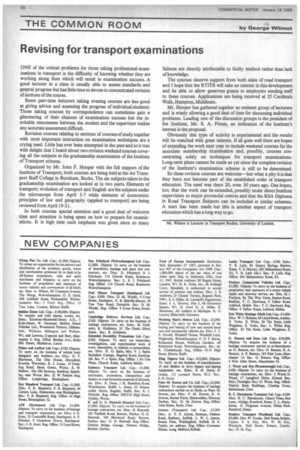Revising for transport examinations
Page 72

If you've noticed an error in this article please click here to report it so we can fix it.
ONE of the critical problems for those taking professional examinations in transport is the difficulty of knowing whether they are working along lines which will result in examination success. A good lecturer in a class is usually able to assess standards and general progress but has little time to devote to concentrated revision of sections of the course.
Some part-time lecturers taking evening courses are less good at giving advice and assessing the progress of individual students. Those taking courses by correspondence can sometimes gain a glimmering of their chances of examination success but the inevitable remoteness between the student and the supervisor makes any accurate assessment difficult.
Revision courses relating to sections of courses of study together with most important instruction on examination techniques are a crying need. Little has ever been attempted in the past and so it was with delight that I heard about two revision weekend courses covering all the subjects in the graduateship examination of the Institute of Transport scheme.
Organized by Mr. John F. Hooper with the full support of the Institute of Transport, both courses are being held at the Air Transport Staff College in Burnham, Bucks. The six subjects taken in the graduateship examination are looked at in two parts. Elements of transport; evolution of transport and English are the subjects under the microscope from April 5-7 while elements of economics; principles of law and geography (applied to transport) are being reviewed from April 19-21.
In both courses special attention and a good deal of welcome time and attention is being spent on how to prepare for examinations. It is high time such emphasis was given since so many failures are directly attributable to faulty method rather than lack of knowledge.
The courses deserve support from both sides of road transport and I hope that the RTITB will take an interest in this development and be able to allow generous grants to employers sending staff to these courses. Applications are being received at 25 Cardinals Walk, Hampton, Middlesex.
Mr. Hooper has gathered together an eminent group of lecturers and is wisely allowing a good deal of time for discussing individual problems. Leading one of the discussion groups is the president of the Institute, Mr. S. A. Finnis, an indication of the Institute's interest in the proposal.
Obviously this type of activity is experimental and the results will be watched with great interest. If all goes well there are hopes of etxtending the work next year to include weekend courses for the associate membership examination and, possibly, courses concentrating solely on techniques for transport examinations. Long-term plans cannot be made as yet since the complete revision of the Institute's examination scheme is still to be determined.
So these revision courses are welcome—but what a pity it is that they have not become part of the established order of transport education. The need was there 20, even 30 years ago. One hopes, too, that the work can be extended, possibly under direct Institute supervision to major provincial centres and that the RSA Diploma in Road Transport Subjects can be included in similar schemes. A start has been made but this is another aspect of transport education which has a long way to go.




















































































































